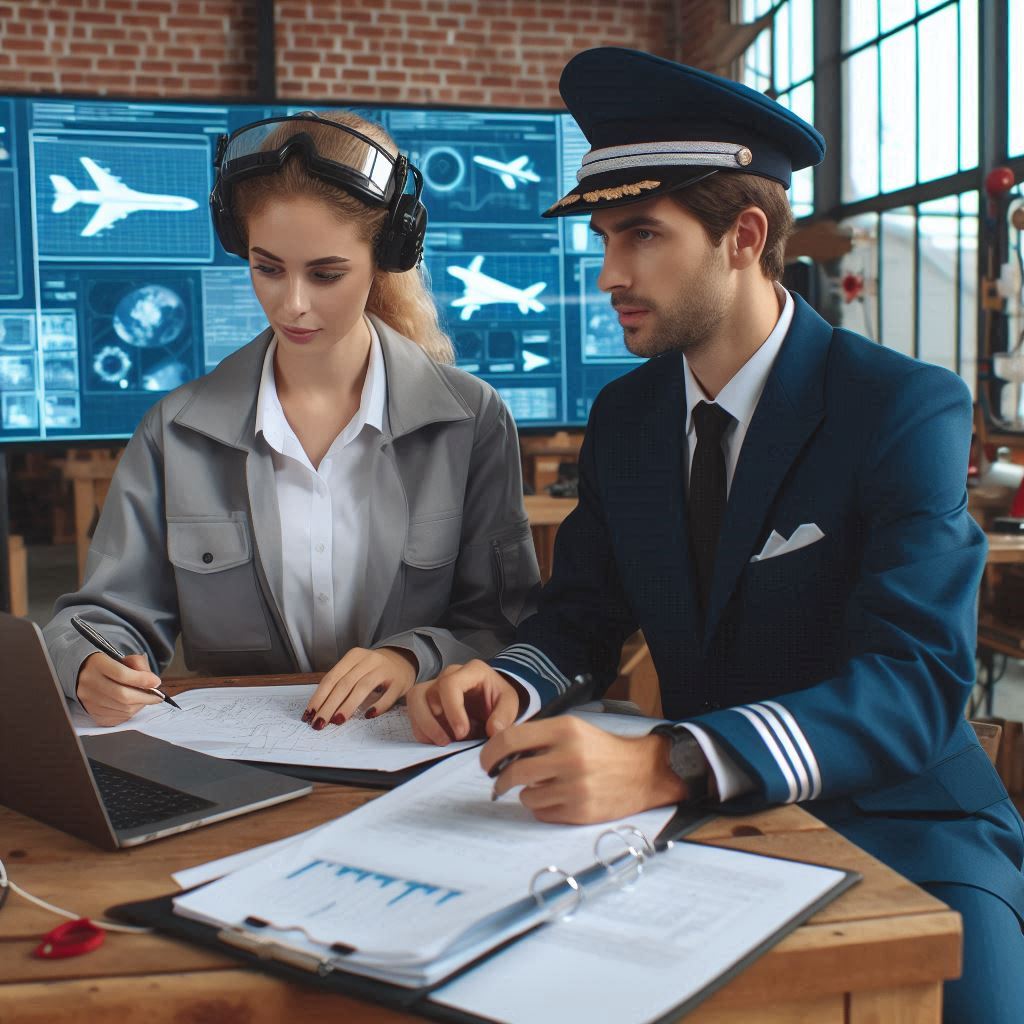Introduction
Aerospace engineering is a fascinating and ever-evolving field dedicated to the design, development, and maintenance of aircraft and spacecraft.
This career combines principles from various engineering disciplines, including mechanical, electrical, and materials engineering, with a deep understanding of physics and mathematics.
Aerospace engineers work on a wide range of projects, from commercial airliners to cutting-edge spacecraft, and contribute to advancements that push the boundaries of technology and exploration.
Career advancement in aerospace engineering is essential for personal and professional growth.
The field is highly dynamic, with constant innovations and emerging technologies reshaping the industry.
To stay relevant, engineers must continuously update their skills and knowledge.
Advancement opportunities, such as pursuing specialized certifications or advanced degrees, can lead to leadership positions and involvement in groundbreaking projects.
By focusing on career development, aerospace engineers can secure their place at the forefront of the industry, influence future technological advancements, and achieve long-term success in this exciting field.
Educational Requirements
Bachelor’s Degree in Aerospace Engineering or Related Field
To advance in aerospace engineering, start with a solid educational foundation.
A bachelor‘s degree in aerospace engineering or a related field is essential.
This degree provides the core knowledge and skills needed for entry-level positions.
Courses typically cover aerodynamics, propulsion, and structural analysis.
Completing this degree is your first step into the aerospace industry.
Advanced Degrees for Higher-Level Positions
A bachelor‘s degree alone may not suffice for higher-level roles.
Advanced degrees often play a crucial role in career progression.
A master‘s degree in aerospace engineering opens doors to specialized positions and offers deeper insights into advanced topics.
It also provides research opportunities that can lead to significant advancements.
For those aiming for roles in academia or high-level research, a Ph.D.
might be necessary.
This degree focuses on original research and advanced problem-solving skills.
Continuing Education and Professional Development Opportunities
Continuing education is vital to keep up with industry advancements.
Aerospace technology evolves rapidly, and staying updated is crucial.
Many professionals pursue certifications to enhance their expertise.
For instance, certifications in project management or systems engineering can be beneficial.
Professional development opportunities also play a significant role.
Workshops, seminars, and conferences offer valuable learning experiences and networking with industry peers.
Online courses provide flexibility for working professionals, allowing them to gain new skills without interrupting their careers.
Platforms like Coursera or edX offer courses from top universities that complement formal education.
Engaging in industry research can also enhance your professional profile.
Participating in cutting-edge projects or publications often leads to innovative solutions and career growth.
Additionally, seeking mentorship from experienced engineers can provide guidance as you navigate your career path.
Joining professional organizations like the American Institute of Aeronautics and Astronautics (AIAA) provides resources, networking opportunities, and access to exclusive industry publications and events.
In summary, a bachelor‘s degree in aerospace engineering is your foundation.
Advanced degrees and certifications can open doors to higher-level positions.
Continuing education and professional development are crucial for staying current.
Engage in research, seek mentorship, and join professional organizations to further your career.
Specializations in Aerospace Engineering
Aerospace engineering offers diverse specializations, each catering to unique interests and career goals.
The field broadly divides into aeronautics and astronautics.
Aeronautics focuses on aircraft and their design, while astronautics deals with space vehicles and space exploration.
Overview of Different Tracks Within the Field
Aeronautics encompasses several areas. You might work on aircraft design, propulsion systems, or aerodynamics.
This track involves improving aircraft performance and safety.
Aeronautics professionals often work with commercial, military, or private aviation sectors.
Astronautics involves the design and development of spacecraft.
This track covers spacecraft systems, propulsion, and space mission planning.
Astronautics experts focus on exploring space and developing technologies for human spaceflight.
Other specializations include satellite engineering, which involves designing and building satellites for communication or Earth observation.
Additionally, you could work on space habitats, robotics for space missions, or space sciences.
Advantages of Specializing in a Specific Area
Specializing offers several advantages. Firstly, it allows you to become an expert in your chosen field.
This expertise often leads to higher job satisfaction and career advancement.
Specialized knowledge can also make you more competitive in the job market.
Additionally, specializing can open doors to unique opportunities.
For instance, expertise in spacecraft design might lead to roles with space agencies like NASA or ESA.
Similarly, specialization in UAV technology might attract roles in defense or commercial sectors.
Specialization can also lead to higher earning potential.
Companies value deep expertise and are willing to pay a premium for specialized skills.
Furthermore, you often get to work on cutting-edge projects and technologies.
How to Choose a Specialization That Aligns with Career Goals
Choosing the right specialization starts with understanding your interests and career goals.
Reflect on what excites you most about aerospace engineering.
Is it aircraft design, space exploration, or satellite technology?
Research various specializations to learn about daily tasks, required skills, and potential employers.
Networking with professionals in different tracks can provide valuable insights.
Attend industry events or seek informational interviews to gain first-hand knowledge.
Consider the future job market and industry trends.
Some areas may offer more growth opportunities based on emerging technologies or government projects.
Aligning your specialization with these trends can enhance job security and career progression.
Finally, seek mentorship from experienced aerospace engineers.
They can guide you based on their experiences and industry knowledge.
Their advice can help you make an informed decision about which specialization best suits your career ambitions.
By carefully choosing your specialization, you can tailor your career path to your interests and goals.
This targeted approach enhances both job satisfaction and professional growth.
Read: The Role of NCARB in US Architecture Licensing.
Networking and Professional Organizations
Importance of Networking in Aerospace Engineering
Networking plays a crucial role in aerospace engineering.
It connects professionals and opens doors to new opportunities.
Building a robust network enhances career growth.
Engaging with peers, mentors, and industry leaders provides valuable insights.
Networking leads to job referrals and collaborative projects.
It helps engineers stay updated on industry trends and advancements.
Overview of Professional Organizations in the Field
Professional organizations offer structured networking opportunities.
They bring together aerospace professionals from various sectors.
Associations like the American Institute of Aeronautics and Astronautics (AIAA) and the Society of Aerospace Engineers (SAE) provide platforms for interaction.
These organizations host events, webinars, and conferences that facilitate professional connections.
Membership often includes access to exclusive industry resources.
Benefits of Joining Industry Associations and Attending Conferences
Joining industry associations offers numerous benefits.
It enhances your credibility and visibility in the field.
Membership includes access to specialized journals, research papers, and industry reports.
These resources keep you informed about technological developments and research.
Associations also provide opportunities for professional development through workshops and certification programs.
Attending conferences is another significant advantage.
These events gather leading experts, innovators, and decision-makers.
They offer opportunities to learn about cutting-edge technologies and trends.
Conferences feature presentations, panel discussions, and networking sessions.
Engaging in these activities helps build relationships with influential figures in aerospace engineering.
Networking at conferences allows you to exchange ideas with peers from different organizations.
It provides a platform to discuss challenges and solutions with others in the field.
Building a network at these events can lead to collaborative projects and career advancements.
You gain exposure to potential employers and industry leaders.
Overall, networking and joining professional organizations are vital for career advancement.
They offer opportunities to connect with industry professionals and stay informed about advancements.
Being active in these communities enhances your career prospects and professional growth.
By participating in industry associations and attending conferences, you position yourself as a knowledgeable and connected aerospace engineer.
Embrace these opportunities to advance your career and contribute to the aerospace industry.
support system that can help propel your career forward.
Read: The Journey: How to Become an Architect in the USA.
Internships and Co-op Programs
Advantages of Gaining Practical Experience Through Internships
Internships and co-op programs are essential for career advancement in aerospace engineering.
They offer hands-on learning opportunities that textbooks cannot provide.
Engaging in real-world projects bridges the gap between theory and practice.
This experience enhances your technical skills and problem-solving abilities.
You gain valuable industry insight and understand daily operations and challenges.
Internships also help you explore specific areas of interest within aerospace engineering.
Networking opportunities arise as you connect with industry experts and peers.
These relationships can lead to mentorship and future job opportunities.
How to Secure Aerospace Engineering Internships
Securing an internship in aerospace engineering requires proactive effort.
Begin by researching aerospace companies and organizations with internship programs.
Use company websites, job boards, and your academic institution‘s career services for information.
Prepare a tailored resume that highlights relevant coursework, projects, and skills.
Craft a compelling cover letter that explains your interest and aligns with the company‘s needs.
Apply early, as many companies have deadlines months in advance.
Stay organized and track your applications carefully.
Leverage your network by reaching out to professors, industry professionals, and alumni for recommendations.
Transform Your Career Today
Unlock a personalized career strategy that drives real results. Get tailored advice and a roadmap designed just for you.
Start NowTips for Making the Most of a Co-op Program
To maximize your co-op experience, start by setting clear goals.
Identify what you want to achieve and how it aligns with your career objectives.
Be proactive in your role; seek additional responsibilities and show your eagerness to contribute.
Regularly seek feedback from supervisors and colleagues to improve your performance.
Building strong relationships with your team and mentors can lead to valuable contacts and job referrals.
After completing the program, reflect on what you learned and how it impacts your career goals.
This reflection will help you plan your next steps effectively.
In summary, internships and co-op programs provide invaluable experience and can significantly impact your aerospace engineering career.
By understanding the advantages, securing opportunities, and making the most of them, you build a solid foundation for future success.
Read: Exploring Architect Salary Trends: USA Analysis.

Explore Further: Biomedical Engineering: Imaging Technologies
Soft Skills for Career Advancement
Importance of Communication, Teamwork, and Leadership Skills
In aerospace engineering, soft skills are as critical as technical expertise.
Communication, teamwork, and leadership drive success in this field.
Effective communication is fundamental.
It ensures that complex engineering concepts are clearly conveyed to colleagues, clients, and stakeholders.
Good communication helps avoid misunderstandings and fosters a collaborative work environment.
Teamwork is equally vital.
Aerospace projects are often complex and require the combined efforts of multiple engineers.
Successful teamwork involves sharing ideas, supporting colleagues, and working towards common goals.
It enhances problem-solving capabilities and promotes innovative solutions.
Leadership skills also play a crucial role.
Being an effective leader means guiding teams, making strategic decisions, and taking responsibility for project outcomes.
Strong leadership inspires and motivates, driving team performance and project success.
How to Develop and Showcase These Skills in the Workplace
Developing these essential soft skills involves both practice and proactive learning.
To improve communication, actively participate in meetings and presentations.
Practice articulating your ideas clearly and seek feedback from peers.
Join professional organizations and attend conferences to enhance your communication skills through networking opportunities.
For teamwork, engage in collaborative projects and volunteer for team roles.
Offer support to colleagues and actively contribute to group efforts.
By being an effective team player, you demonstrate your ability to work well with others and achieve collective goals.
Leadership skills can be developed through taking on project management responsibilities.
Lead small teams, manage projects, and make strategic decisions.
Pursue leadership training programs and seek mentorship from experienced leaders.
To showcase these skills, highlight specific examples during performance reviews where your communication, teamwork, and leadership contributed to project success.
Share instances where your abilities positively impacted team dynamics and project outcomes.
How Soft Skills Can Enhance Career Growth and Advancement Opportunities
Soft skills significantly impact career growth and advancement.
Strong communication skills build professional relationships and enhance your reputation within the organization.
Effective communicators are often seen as valuable assets, leading to more opportunities for advancement.
Teamwork enhances your ability to collaborate effectively, making you a valuable team member.
It can lead to increased responsibilities and recognition within the team.
Leadership skills are critical for those seeking to move into higher-level roles.
Demonstrating leadership qualities positions you as a candidate for promotions and expanded responsibilities.
Overall, soft skills help you navigate career challenges and capitalize on advancement opportunities.
By mastering and showcasing these skills, you improve your prospects for career growth and long-term success.
In summary, developing and showcasing soft skills like communication, teamwork, and leadership are crucial for career advancement in aerospace engineering.
These skills not only improve your effectiveness in your current role but also open doors for future opportunities.
Prioritizing soft skills enhances your professional growth and helps you achieve your career objectives.
ogress in their careers.
Read: Comparison: Architecture Styles across American Regions.
Continuing Education and Certifications
Advancing in aerospace engineering often requires more than just experience.
Advanced certifications and continuing education play a crucial role.
They not only boost your knowledge but also enhance your career prospects.
Here‘s how pursuing further education and certifications can benefit you.
Overview of Advanced Certifications
Several advanced certifications can propel your career in aerospace engineering.
The Certified Aerospace Technician (CAT) certification demonstrates your expertise in aerospace systems.
The American Institute of Aeronautics and Astronautics (AIAA) offers specialized certifications in areas like propulsion and avionics.
Additionally, the Project Management Professional (PMP) certification is valuable for those managing aerospace projects.
Each of these certifications can highlight your commitment to the field and set you apart from peers.
Benefits of Pursuing Further Education and Certifications
Pursuing further education and certifications offers numerous advantages.
It enhances your technical skills and keeps you updated on industry advancements.
Certifications also increase your credibility with employers and clients.
They often lead to higher salary potential and more job opportunities.
Additionally, obtaining these credentials can make you more competitive for leadership roles.
By expanding your knowledge, you can also contribute more effectively to your team and projects.
Balancing Work and Continuing Education Commitments
Balancing work and continuing education requires effective time management.
Start by setting clear goals for both your professional and educational pursuits.
Prioritize your tasks and create a schedule that accommodates both work and study.
It‘s essential to communicate with your employer about your educational goals.
Many companies offer support such as flexible hours or tuition reimbursement.
Leverage online courses or part-time programs that fit your work schedule.
Efficiently managing your time and responsibilities can help you achieve your career and educational objectives without compromising either.
In summary, advanced certifications and continuing education are pivotal for career advancement in aerospace engineering.
They offer substantial benefits, including enhanced skills, credibility, and job prospects.
Balancing work and education requires thoughtful planning and support, but it can significantly boost your career growth.
Embrace these opportunities to stay ahead in a dynamic field.
Space engineering.
Explore Further: Career Path: From Junior to Senior Cybersecurity Analyst
Conclusion
After exploring various career advancement tips for aerospace engineering professionals, it is evident that continuous learning and skill development are essential components for success in this field.
By actively pursuing educational opportunities, such as obtaining advanced degrees or certifications, individuals can expand their knowledge base and stay current with industry trends.
Networking plays a crucial role in career advancement, as it allows professionals to connect with others in the field, exchange ideas, and potentially open doors to new opportunities.
Furthermore, developing soft skills, such as communication and leadership abilities, can enhance an aerospace engineer’s role within their organization and help them stand out among their peers.
Basically, aerospace engineering professionals are encouraged to take proactive steps towards advancing their careers by investing in their education.
Building a strong professional network, and continuously refining their skills.
By embracing these strategies, individuals can position themselves for long-term success in the dynamic and rewarding field of aerospace engineering.
[E-Books for Sale]
The Big Book of 500 High-Paying Jobs in America: Unlock Your Earning Potential
$19.99 • 500 High-Paying Jobs • 330 pages
Explore 500 high-paying jobs in America and learn how to boost your career, earn more, and achieve success!
See All 500 High-Paying Jobs of this E-Book
1001 Professions Without a Degree: High-Paying American Jobs You Can Start Now
$19.99 • 1001 Professions Without a Degree • 174 pages
Discover 1001 high-paying jobs without a degree! Unlock career tips, skills, and success strategies for just $19.99!




